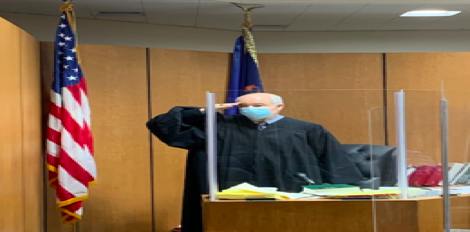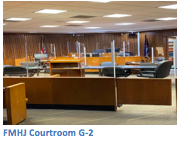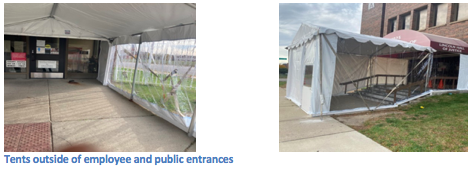|
December 2020 Newsletter Headlines
|
IN MEMORY OF THOSE WE LOST
In Loving Memory:
Your presence we miss, your memory we treasure, loving you always, forgetting you never.
 Mark Kappen served the Court as an ITSB Contractor in the Court's Administration Division for over 20 years. Mark Kappen served the Court as an ITSB Contractor in the Court's Administration Division for over 20 years.
|
|

Court Insights from GenZ with Jordan Taylor
Assignment: Observe and Record Your Impressions of Court Hearings
"Last week I learned a lot of information about how court cases work which was really helpful considering that I have never seen a live hearing before. The very first thing I learned from watching a hearing involving theft is that you can lie but it will get you absolutely nowhere. When the case is going on the prosecution is bringing all of the evidence and receipts that could possibly be found for the situation. If you say something that is not adding up with the evidence that has been found, you can find yourself in more trouble than what you were in before.
The second thing I learned is that you should have proper etiquette in a Zoom courtroom or an in-person hearing. For the in-person hearings, you should stand up when the judge enters or leaves the courtroom and when you are asked to address the judge. Also you should be polite to everyone, and you should not interrupt others when they are speaking. Another thing that shows proper courtroom etiquette is shutting off your phone well in advance before you enter the courtroom so it isn't a distraction.
The third thing I found out is that you should value your freedom. Everyone makes mistakes but, every mistake has a consequence; and you should try to live your life as free of consequences as possible."
Jordan is a 2020 Cristo Rey Graduate Candidate and completing a virtual internship with Court Administration. As Jordan has not planned on pursuing a career in law, his internship is based on examining the justice system with the goals of being an informed citizen. Throughout his internship, Jordan's assignments will be shared in "Court Insights from GenZ with Jordan Taylor" and posted on the Court's various social media platforms and shared with his teachers and fellow students.
|

Courts exist to do justice, to guarantee liberty, to enhance social order, to resolve disputes, to maintain rule of law, to provide for equal protection, and to ensure due process of law. One of the most quintessential purposes of Court's existence is to ensure the quality of individuals and the government is reality rather than empty rhetoric.
The most fundamental aspect of court leadership is an understanding of the purposes and responsibilities of the Court and providing the leadership to ensure that these continuously guide court operations, policies, and procedures. Pursuant to the judicial authority granted in the United States Constitution and the constitutions of states and territories and applicable laws, the primary responsibility of the judicial branch is to provide an impartial forum for the resolution of disputes. This ensures the rule of law and protection of individual rights. Over time, this fundamental responsibility of the judicial branch has been expanded to encompass other areas of importance, including but not limited to the following:
- To promote justice in individual cases.
- To ensure the public perceptions of justice in individual cases.
- To provide an impartial forum for the resolution of legal disputes.
- To protect individuals against the arbitrary use of governmental power.
- To provide for a formal record of legal status.
- To deter criminal behavior.
- To rehabilitate individuals convicted of crime.
- To provide for the separation of convicted individuals from society where necessary.
Carrying out the fundamental purposes and responsibilities of a court requires all court leaders, regardless of their specific position, to ensure their respective courts provide access to all who seek court intervention and support the timely and fair disposition of all cases. Articulated by Professor Ernest Friesen, first Director of the Institute for Court Management (ICM)
The pandemic caused a disruption in the court system which affected both the courts and lawyers alike. While the pandemic forced businesses to close and people to shelter in place for varying times, judges and attorneys around the globe were forced to transform their practices almost immediately. Courts were forced to find ways to providing a way for the public to access justice safely while simultaneously providing a forum for the resolution of legal disputes and doing individual justice in individual cases.
The Courts are deemed an "essential" operation, similar to law enforcement and health care providers during emergency situations. The Courts are required to continue to perform its core judicial functions to ensuring access to justice, protecting due process, and providing a forum for the orderly resolution of disputes because citizens expect to interact with the Court as easily and conveniently as they do with a bank or airline.
Third Judicial Circuit Court has remained open to evolving as a Court to better serve the citizens of Wayne County throughout the ongoing pandemic, operating under provisions established by a series of Michigan Supreme Court orders. These orders have limited in-person proceedings and called for the establishment of health and safety guidelines for court users and staff. As a result, Third Circuit has had to adapt to new conditions, innovating new ways to conduct business.
The Court feels a strong responsibility for our employees' health and safety during this public health emergency. To address these safety concerns, the Court has already implemented social distancing and is preventing anyone who is ill from entering court facilities. Where it is possible and feasible, remote or telecommuting work has been implemented. Signs have been posted to encourage employees to maintain spacing of 6 ft. between themselves while inside the courthouse. Standard in-person meetings have been replaced with conference calls to the extent possible.
Third Judicial Circuit Court continues to set the trends to conduct core functions, which include installing plexiglass barriers in courtrooms, and installing hand sanitizer stations throughout the courthouse. New stakeholders have emerged during the pandemic which include Garden City Hospital, Local Health Departments, Zoom, etc. Employees report to work based on the Court's determination regarding which operations, functions, and employees are necessary to support the most critical Court services and to prepare for the resumption of service.
Third Judicial Circuit Court will continue to provide, as available and appropriate, hand sanitizer, disinfectant wipes, gloves, and masks. The additional cleaning and disinfecting services will continue when a positive exposure has been identified.
These are unprecedented times we live in and we must continually look at ways to provide access to justice in a safe manner.
This evolution in how the courts operate is not a one and done - these are changes that will enhance the ability of the courts to operate under varied circumstances now and into the future.
|

The Third Circuit Court Diversity and Inclusion Team's Mission:
"We appreciate our common connection and respect our diverse and unique human experiences. We move forward as an inclusive organization as we provide accessible and equal justice."
The Court's Diversity & Inclusion Team strives to ensure the values of its diverse bench, staff, and court users are acknowledged and reflected in our delivery of service as well as our work environment.
In that spirit, the team creates and shares a monthly list of various holidays and observations along with some celebration suggestions. We invite our work community and the community at large to contribute.
January 2021
New Year's Day January 1
Nat'l Spaghetti Day January 4
Nat'l Bird Day January 5
Epiphany Day January 6
Orthodox Christmas Day January 7
Law Enfor. Appreciation Day
January 9
Human Trafficking Awareness Day January 11
Martin Luther King Day January 18
Kiss a Ginger Day January 12
Orthodox New Year January 14
Religious Freedom Day January 16
National Popcorn Day January 19
Inauguration Day January 20
National Pie Day January 23
International Day of Education January 24
National Spouses Day January 26
Int'l Holocaust Remembrance Day January 27
National Hot Chocolate Day
January 31
|
-
Dec 24, 2020 - Dec 31, 2020
Holiday Season
-
Jan 01, 2021 - New Year's Day
|
|
Join our E-mail List and receive our monthly E-mail newsletter from the Third Judicial Circuit Court and stay informed.
Please send us your name and email address to -
|
|
|
|
Greetings,
How we celebrate the holiday season may be different this year as we practice social distancing. However, what we celebrate has not changed. We celebrate kindness and kinship with family, friends, and colleagues. We even go beyond our immediate and regular social circle and share kindness with strangers. Our present circumstances may necessitate we gather on Zoom and share holiday stories and family traditions and that we spread kindness with virtual donations. Our imaginations will be our guide as we find ways to celebrate 2020 Hanukkah, Christmas, Kwanzaa, and other December holidays. In whatever way you choose to celebrate, may your holidays be bright and kindness overflows.
|

The Third Circuit Court wishes to acknowledge Judge Craig S. Strong and Judge Ulysses W. Boykin for their committed years of service and wishes them the best in their retirement.
|

Judge Chandra Baker was elected to the Third Judicial Circuit Court in November and will be assigned to the Criminal Division.
Prior to being elected, Judge Baker was a Lead Attorney with the Wayne County Prosecutor's Office. She headed the Wayne Arson Reduction Unit (W.A.R) responsible for prosecuting arson for-profit crimes involving real property (insurance fraud), arson of multi-unit buildings in which one of those units is a dwelling and arsons where someone was killed or injured. Judge Baker has been a prosecutor for nearly 12 years, and she has litigated felonies of all kinds including homicide, armed robbery, and various other felony cases. She was awarded Prosecutor of the Year 2017-2018 by the International Association of Arson Investigators for her work in combating arson in Wayne County.
Previous to joining the Wayne County Prosecutor's Office, Judge Baker was an Associate with Miller, Canfield, Paddock and Stone, P.L.C. a civil defense firm. At MCPS, she was in the Labor and Employment section.
Judge Baker has been a member of the Attorney Grievance Commission since 2012. She was President of the Barristers from 2009-2010. She also was awarded the 2006 Impact on Domestic Violence Award by the Legal Aid and Defenders Association, Inc.
Judge Baker volunteered for Save Kids of Incarcerated Parents (S.K.I.P) from 2004-2008 and she won the volunteer award in 2008. She currently volunteers with Grace Kids, the Children's Ministry at Grace Community Church in Detroit. She also serves as a board member for Citadel Community Development Corporation.
Judge Baker was raised in Detroit and attended Cass Technical H.S. She then received her B.A. Degree from the University of Michigan and her Juris Doctorate from Wayne State University Law School in 2003.

Judge Mary Beth Kelly was elected to the Third Circuit Court in November and will serve in the Domestic Relations-Family Division. Judge Kelly previously served on Third Circuit Court for 11 years when she was appointed by then-Gov. John Engler in 1999. She became the first woman to serve as Chief Judge of Third Circuit Court. She was elected to the Michigan Supreme Court on November 2, 2010 and took office on January 1, 2011. During her tenure, she served as co-chair of the Michigan Race Equity Coalition, which examined the need for the juvenile justice and foster care systems to improve policies and racial disparities through accurate and meaningful data. On October 1, 2015, Judge Kelly returned to private practice at Bodman PLC in Detroit. Judge Kelly has served as a visiting judge in the Domestic Relations-Family Division and was a contributor on the Third Circuit Court's committee to reimagine the delivery of services provided by the Court's Clinic for Child Study.
|
|
Third Circuit Court would like to welcome Yvonne Owen, the new Senior Human Resources Manager.
Yvonne S. Owen comes to the 3rd Judicial Circuit Court with a broad base of experience in labor relations and employment law from both the private and public sectors. She has over 20 years of experience that has been built from all levels of these organizations; her most recent experience was that of manager of the Human Resources Department of Wayne County Probate Court.
Yvonne has a strong belief in the value of lifelong learning and education. Putting this belief into practice has resulted in her being awarded many certifications that have been augmented through more formal education. During her career she returned to school and earned an Associates' Degree in Computer Information Systems, Bachelor's Degree in Business Administration majoring in Human Resources Management, and a Master's Degree in Human Resources and Labor Relations.
In her leisure time, Yvonne is an avid roller coaster fanatic (Cedar Point is a favorite summertime destination), loves spending time with her family (a blended group of 5 children and 5 grandchildren ranging in age from 3 to 23), likes to travel, spends time at the cottage, and enjoys outdoor activities including: hiking, kayaking, bicycling, and swimming. Not only is she certified in human resources related areas, Yvonne has been certified as a balloon handler by the Detroit Parade Company and has been in several Thanksgiving Day Parades. During this pandemic, she tries to focus on what activities can still safely be done, rather than lamenting those activities that will (for now) have to wait.
With over 20 years of experience in Human Resources and Labor Relations, Yvonne is truly excited to be a part of the 3rd Judicial Circuit Court Human Resources team and sees this as an opportunity to utilize her education, experience, and training and to further enhance them.
|
|

VETERANS TREATMENT COURT CELEBRATES FOUR GRADUATES AND A RETIREMENT
On December 2nd, Veterans Treatment Court (VTC) honored four program participants who successfully completed their two years of intensive probation. Judge Ulysses W. Boykin and Judge Deborah A. Thomas presided over their cases.
Specialty Court Coordinator, John Marra, also a United States Army-Combat Veteran, compared their probationary period, during the current pandemic, to when they were in the military; and how you have to always be prepared for the unknown and stay on task.
And that is just what these graduates did; they stayed the course, despite the challenges this year has thrown their way.
The VTC team also acknowledged the retirement of Supervising Judge, Ulysses W. Boykin, who was a United States Army, Commissioned Officer. Judge Boykin joined the VTC team in January of 2017, following the retirement of VTC Supervising Judge, Judge James Callahan, who was a United States Navy veteran.
The Veterans of Foreign Wars, 4th District Honor Guard presented Judge Boykin with a plaque acknowledging his outstanding service to the program and to Michigan veterans.
Judge Boykin will surely be missed.
Thank you to Chief Judge Timothy M. Kenny; Executive Court Administrator, Zenell Brown; Chief Financial Officer, Lyn Roberts and her team; General Counsel, Richard Lynch; Deputy Court Administrator, Alisa Shannon; and Director of Criminal Court Services, Tamela Aikens for their continued support of the efforts within Specialty Court Services. As well as to our multitude of community partners, without whom we could not do the work we do as a team.

|
|
Preparing our Facilities to Address the Pandemic
Facility planning for the COVID-19 pandemic is critical for ensuring a safe and healthy work environment to our employees, stakeholders, and the public. Court administration, along with staff in the Facilities and Purchasing Department, have worked together to have operations ready for day-to-day use, but also establish new workspace layouts and practices to provide a safe environment. CDC guidelines were used as the primary tool in developing the overall plans for the Court's workplace preparedness. CARES Act funding was made available to address our facility needs through a partnership with Wayne County.
Plexi-glass Barriers
CDC guidelines recommend spacing desks and seating areas at least six feet apart from one another, and installing barriers or dividers between areas if that's not possible. Standards for plexi-glass barriers were developed to address courtrooms and departments with public access within the various buildings. Non-public access areas were able to achieve social distancing through seating reassignments and remote work schedules.
Courtroom Standard
Sneeze barriers in the courtrooms were placed to facilitate social distancing and protect individuals on three sides (front, right, and left) for interactions that occur at sitting or standing position. (The height of shield accommodates a person up to 6'2" tall standing). Shields covering the three sides were placed around the judge's bench and workstations for the court reporter, clerk, witness, and sheriff. The counsel tables and lectern were also protected on three sides. Shields were placed around the jury box, defendant box, and galley. These shields are configured to protect the outer sides and do not separate individuals sitting within these areas. Seating was eliminated or reconfigured within these areas to accomplish the social distancing.

Public Access Department Standard
Sneeze barriers were placed on departmental public counters and/or customer windows to protect individuals for interactions that occur at a sitting or standing position. Non-public access areas were not outfitted with sneeze barriers because social distancing could be accomplished through seating reassignments and remote work schedules.
COVID-19 Health Screening
CDC guidelines recommend checking temperatures of individuals entering the facility and requiring everyone to wear masks. If someone should appear to have symptoms, they should not be allowed access to the facility.
The Court has contracted with vendors to provide licensed health care professionals to conduct daily in-person temperature checks using non-contact thermometers and health questionnaire screening. Given the differences in the various buildings, these COVID-19 health screenings take place either in tents which have been set up to allow space prior to entering the building or in the lobby/vestibule of the building.

Other Safety Protocols
Sanitation and Disinfectant
CDC recommends wearing masks and washing hands with soap and water or using hand sanitizer because these precautions can help reduce spreading germs. CDC also recommends cleaning and disinfectingsurfaces, at least once daily, that are frequently touched by multiple people, such as door handles, light switches, elevator buttons, etc.
Personal protection equipment (PPE) such as mask, hand sanitizer and disinfectant supplies to help combat the spread of COVID-19 are available to staff and can be obtained from the Facilities Department. We have also expanded the building cleaning maintenance contract to include touch point cleaning multiple times throughout the day.
Signs/Decals
CDC recommends using signs, tape marks, or other visual cues such as decals or colored tape to show where to stand or sit to accommodate social distancing when physical barriers are not possible.
Signage and decals have been placed throughout the buildings to encourage social distancing, as well as, mark the appropriate place to stand or sit to allow 6 ft. of distance between each other. Instructions and reminders have been posted on hand hygiene, COVID-19 symptoms, wearing cloth face coverings, cough and sneeze etiquette.
Staying Safe at the Office
The unprecedented nature of the COVID-19 pandemic requires action from all of us. When it comes to protecting yourself here at work, experts say that the three most important things are wearing a mask, social distancing, and practicing good hand hygiene.
While the workplace layouts and safety protocols may not be the most comfortable or convenient, remember that they're put in place to keep both you and your coworkers safe. We are committed to protecting the safety and health of our employees and those entering our facilities.
|
|
|
|
|